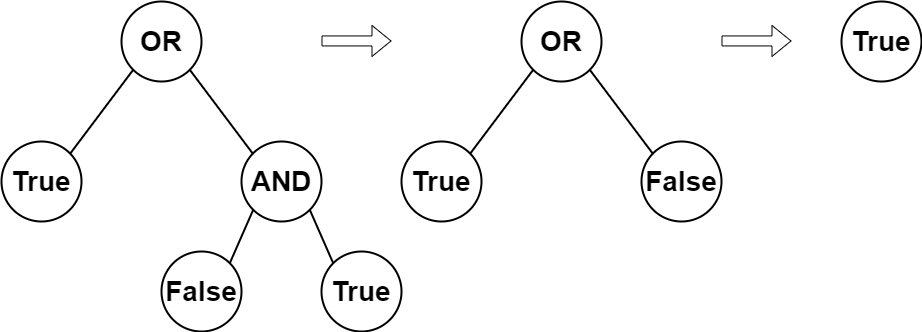You are given the root of a full binary tree with the following properties:
- Leaf nodes have either the value
0or1, where0representsFalseand1representsTrue. - Non-leaf nodes have either the value
2or3, where2represents the booleanORand3represents the booleanAND.
The evaluation of a node is as follows:
- If the node is a leaf node, the evaluation is the value of the node, i.e.
TrueorFalse. - Otherwise, evaluate the node's two children and apply the boolean operation of its value with the children's evaluations.
Return the boolean result of evaluating the root node.
A full binary tree is a binary tree where each node has either 0 or 2 children.
A leaf node is a node that has zero children.
Example 1:
Input: root = [2,1,3,null,null,0,1] Output: true Explanation: The above diagram illustrates the evaluation process. The AND node evaluates to False AND True = False. The OR node evaluates to True OR False = True. The root node evaluates to True, so we return true.
Example 2:
Input: root = [0] Output: false Explanation: The root node is a leaf node and it evaluates to false, so we return false.
Constraints:
- The number of nodes in the tree is in the range
[1, 1000]. 0 <= Node.val <= 3- Every node has either
0or2children. - Leaf nodes have a value of
0or1. - Non-leaf nodes have a value of
2or3.
# Definition for a binary tree node.
# class TreeNode:
# def __init__(self, val=0, left=None, right=None):
# self.val = val
# self.left = left
# self.right = right
class Solution:
def evaluateTree(self, root: Optional[TreeNode]) -> bool:
def dfs(root):
if root.left is None and root.right is None:
return bool(root.val)
l, r = dfs(root.left), dfs(root.right)
return (l or r) if root.val == 2 else (l and r)
return dfs(root)/**
* Definition for a binary tree node.
* public class TreeNode {
* int val;
* TreeNode left;
* TreeNode right;
* TreeNode() {}
* TreeNode(int val) { this.val = val; }
* TreeNode(int val, TreeNode left, TreeNode right) {
* this.val = val;
* this.left = left;
* this.right = right;
* }
* }
*/
class Solution {
public boolean evaluateTree(TreeNode root) {
return dfs(root);
}
private boolean dfs(TreeNode root) {
if (root.left == null && root.right == null) {
return root.val == 1;
}
boolean l = dfs(root.left), r = dfs(root.right);
if (root.val == 2) {
return l || r;
}
return l && r;
}
}/**
* Definition for a binary tree node.
* struct TreeNode {
* int val;
* TreeNode *left;
* TreeNode *right;
* TreeNode() : val(0), left(nullptr), right(nullptr) {}
* TreeNode(int x) : val(x), left(nullptr), right(nullptr) {}
* TreeNode(int x, TreeNode *left, TreeNode *right) : val(x), left(left), right(right) {}
* };
*/
class Solution {
public:
bool evaluateTree(TreeNode* root) {
return dfs(root);
}
bool dfs(TreeNode* root) {
if (!root->left && !root->right) return root->val;
bool l = dfs(root->left), r = dfs(root->right);
if (root->val == 2) return l || r;
return l && r;
}
};/**
* Definition for a binary tree node.
* type TreeNode struct {
* Val int
* Left *TreeNode
* Right *TreeNode
* }
*/
func evaluateTree(root *TreeNode) bool {
var dfs func(*TreeNode) bool
dfs = func(root *TreeNode) bool {
if root.Left == nil && root.Right == nil {
return root.Val == 1
}
l, r := dfs(root.Left), dfs(root.Right)
if root.Val == 2 {
return l || r
}
return l && r
}
return dfs(root)
}/**
* Definition for a binary tree node.
* class TreeNode {
* val: number
* left: TreeNode | null
* right: TreeNode | null
* constructor(val?: number, left?: TreeNode | null, right?: TreeNode | null) {
* this.val = (val===undefined ? 0 : val)
* this.left = (left===undefined ? null : left)
* this.right = (right===undefined ? null : right)
* }
* }
*/
function evaluateTree(root: TreeNode | null): boolean {
const { val, left, right } = root;
if (left == null && right == null) {
return !!val;
}
if (val === 2) {
return evaluateTree(left) || evaluateTree(right);
}
return evaluateTree(left) && evaluateTree(right);
}
